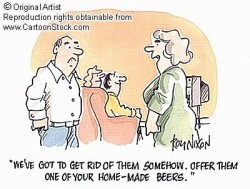|
Common Problems in Homebrewing
 |
While
it's true that homebrewing can be a very satisfactory and pleasurable
pastime, producing good quality beer at economical prices, it is also
true that problems can, and do, arise from time to time.
A
fairly common problem for the beginner especially is that of "set
mash." This is where the mash actually starts to set, maybe get a
crust, and generally develop the consistency of very thick porage oats.
This is not good, as we need to maintain a liquid consistency. Causes
of this problem can be the over-enthusiastic use of an electric grinder
to crush the grist, or poor quality malted barley.
The remedy
here is to initially dilute with water. If this fails, i.e., it just
breaks into lumps instead of reducing to a nice even consistency, the
only recourse is to discard it and start again. If you feel the quality
of the malted barley is not up to par, then you can add up to 10% of a
highly diastatic malt extract. This is an extract that contains a high
proportion of the enzymes which convert starch into sugar, and also
break down long proteins.
Another hiccup can be when
fermentation fails to start. The usual causes of this are an
environment that is too cold, the use of poor quality yeast, or the
specific gravity is too high.
The fix here is to get the
temperature to a minimum 60 degrees F. And if the specific gravity is
too high, warm the brew, stir well, and add more yeast.
Slow
fermentation is another nuisance; again, the temperature could be too
low, or poor quality yeast or malted barley may have been used. There
may be excessive nitrates in the water or the hop content could be too
high (this is indicated by the lack of a nice yeasty head).
Depending
on what you think the cause is, the usual course of action is to use
fresh yeast at least every third brew, and make sure it is a quality
yeast of the correct type (brewers yeast). Using a yeast starter can be
a good idea to get the process off to a good start. If high nitrate
levels are suspected, you should be using normal tap water, possibly
run through a nitrate filter if you are in a known high nitrate area.
And sometimes, just a good stir will get things going, especially if
you think you may have overdone the hops.
If your beer turns out
to be flat and lifeless, you should look at such things as faulty
bottle closures. In other words, make sure there is a good seal. The
fermentation temperature could have been too low, as you need a minimum
temperature of 60 degrees F. Or you may have left it too long between
the end of fermentation and bottling. Just try shortening the interval
next time.
A sour tasting beer can result from the same
catalysts that cause flat beer (above), with the addition of possibly
insufficient sterilizing, so make sure you are scrupulous in this
regard, using campden tablets or something similar. Also the
fermentation process may have been compromised by the yeast being
killed off by extremes in temperature. Make sure that your brew stays
within the limits, i.e., no less than 60 degrees F and no more than 85
degrees F.
The final problem we'll highlight here is with the
beer being just too bitter. This can be due to the excessive use of
hops, in which case just reduce the amount used. Another potential
cause is not enough air circulation during fermentation. A good
practice to avoid is removing the cover daily and skimming the debris
off the top.
So there you have it. Just a little knowledge and
attention to detail can save us from many of the common problems that
beset the homebrewer. Don't let a few setbacks put you off, but use them as learning experiences and you will be a better brewer for it.
|









